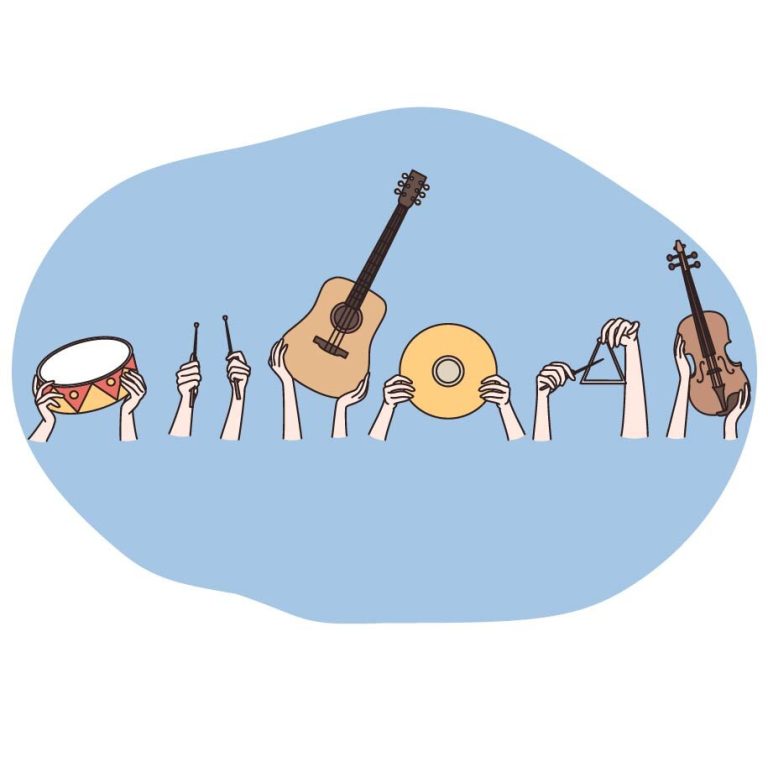Throughout Pakistan’s history and into modern times, music has played a significant role in shaping the country’s cultural identity. Pakistani music spans the religious Qawwali to the upbeat Bhangra sounds, offering something for listeners of all tastes. You may have heard of some Pakistani musicians like Nusrat Fateh Ali Khan, Abida Parveen, or Atif Aslam. And in recent years, they have emerged as a major player on the global scene. We also have Rahat Fateh Ali Khan’s songs roaming over the internet due to his melodious and rhyming vocals. Not to mention that his qawwalis have made a place in the hearts of people all around the globe.
Pop and rock are the most well-known forms of Pakistani music, but the country’s regional music is just as vibrant and varied. Traditional music from each province in Pakistan has its own distinct sound. For example, Atif Aslam has a distinct style of singing from the rest of the other singers. And same goes for the Nazia Iqbal songs. They are only known for their melodious vocals all over the regional community of Pakistan. This article will discuss ten types of Pakistani regional music that you really must add to your playlist. We’ll listen to music from all throughout Pakistan, from the mellowness of Balochi to the vivacity of Punjabi bhangra.
Qawwali
Qawwali is a devotional music style with its roots in the Sufi mosques of Pakistan and India. It has strong vocals, catchy tunes that repeat, and lots of percussion. Love, spirituality, and devotion are common themes in the Urdu and Persian lyrics that are traditionally sung in Qawwali. Musicians such as harmonium players, tabla players, and others frequently join qawwali singers in what is called “qawwali parties” when they perform.
Ghazal
The ghazal is a type of Persian poetry that gained widespread recognition in India. It is typically sung in Urdu or Punjabi and is distinguished by its poetic and romantic themes. A vocalist, harmonium player, and tabla musician are the standard backing band for a ghazal performance. The music is gentle and soothing, drawing attention to the lyrics and the feelings they express.
Folk Music from Sindh
Traditional music from the Sindh province of Pakistan is known as Sindhi folk music. The lively and upbeat rhythms of this genre make it a common choice for weddings and other festive events. The dholak, a percussion instrument, the shehnai, a wind instrument, and the algooza, a flute, are all utilized in Sindhi folk music. Love, nature, and societal issues are common topics in the lyrics of Sindhi folk songs, which are typically sung in the Sindhi language.
Balochi Musical Performances
Traditional Balochi music comes from the Balochi people of Pakistan’s Balochistan province. Simple, repetitive melodies played on the doh-tara, a two-stringed instrument, and the sound, a lute, are typical of Balochi music. Balochi songs typically feature Balochi-language lyrics that touch on romantic, military, and heroic themes.
Afghani or Pashto Music
The Pashtun people of Pakistan’s Khyber Pakhtunkhwa area and neighboring Afghanistan have their own distinct musical culture known as Pashto. Pashto music is known for its upbeat tempos and is commonly played at celebrations like weddings. The rabab is a stringed instrument and the tabla is a percussion instrument commonly employed in Pashto music. Love, conflict, and social issues are often explored in the Pashto language lyrics of popular Pashto songs.
Music from Punjab, India
Traditional music from the Punjab province of Pakistan is known as Punjabi folk music. Its upbeat, festive rhythms make it a common choice for weddings and other joyous occasions. The dhol (a percussion instrument), the tumbi (a stringed instrument), and the algoza (a flute) are all employed in Punjabi folk music. The lyrics of traditional Punjabi folk songs are typically sung in the Punjabi language and deal with topics such as romantic love, the environment, and social justice.
Music from Saraiki
Traditional Saraiki music can be found in the sections of Pakistan where the Saraiki language is spoken. This includes the provinces of Punjab, Sindh, and Balochistan. Saraiki music is typically used at weddings and other joyous events because of its slow and beautiful rhythms. Saraiki music typically features the keyboard-like harmonium and the percussion instrument dholak. Saraiki songs typically have Saraiki language lyrics that address topics including romantic interest, the environment, and social justice.
Music from Kashmir
Kashmiri music is the folk music of the Kashmir valley, which straddles the border between Pakistan and India. Its uplifting melodies make it a popular choice for such occasions as weddings. The santoor (a hammered dulcimer) and the rabab (a stringed instrument) are two of the mainstays of Kashmiri music. Love, nature, and spirituality are common topics in the lyrics of Kashmiri songs, which are typically written in the Kashmiri language.
Hindi Rhythms
Hazara people in Pakistan are known for their unique musical style, Hindko. It’s great for weddings and other happy occasions because of its soothing melody. The harmonium and the tabla are two of the main instruments in Hindko music. Love, nature, and societal issues are often explored in the lyrics of Hindko songs, which are typically sung in the Hindko language.
Music from the Kalash
Traditional Kalash music comes from the Chitral region of Pakistan and is performed by the Kalash people. Typically played at celebrations and other cultural events, Kalash music is known for its upbeat and lively rhythms. Kalash music typically features the dhol (a percussion instrument) and the sitar (a stringed instrument). Kalash songs typically have Kalasha language lyrics that explore romantic and spiritual topics.
Conclusion
Finally, the music of Pakistan’s various regions is varied and steeped in history and tradition. Each musical style, from the solemn Qawwali to the joyful Saraiki, has its own distinctive features that are indicative of the local culture and customs. Listening to any of these 10 regional music styles from Pakistan is a great way to learn about and appreciate the country’s many musical traditions.

